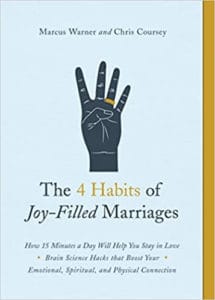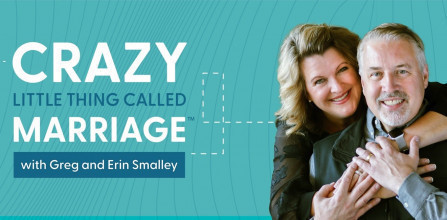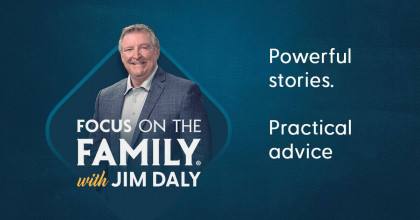Dr. Marcus Warner: You think about it, uh, friendship is the foundation of a really good marriage, you wanna be good friends. And if you’re not playing together, are you really friends, you know? (laughs)
John Fuller: That’s Dr. Marcus Warner and he’s our guest today on Focus on the Family, along with his company-author, Chris Coursey. Your host is Focus president and author Jim Daly, and I’m John Fuller.
Jim Daly: Here at Focus, uh, we talk about marriage quite a bit, John.
John: We do.
Jim: You know, we- it’s a good thing. And, uh, we want your marriage to be the best it could possibly be. And you can have that kind of marriage. I’m talking about the resources, the tools, all the things here at focus we’re trying to, uh, equip you with so you can practice a good marriage. Somebody said the other day to me, you know, we spend a lot of time, uh, you know, getting a license to do something, you know, or working hard vocationally, but we really don’t put, unfortunately, a lot of work into our marriage.
John: Hmm.
Jim: And I think, uh, it’s a good reminder that if you don’t do that, it’ll wither and sometimes die. So we want to plow that good ground around that plant of marriage; feed it, nurture it. Sometimes I do that well, sometimes I don’t do that well. And today, we want to be able to talk about the tools that you need to do it better. You know, in the New Testament, 1 Thessalonians, it says, “Rejoice always.” And sometimes in marriage, and certainly in other relationships, it can be challenge. Uh, you know, the joy sucking occurs rather than the joy fountain. And, uh, today we want to give you some tools to cultivate that spirit of joy in your marriage.
John: Dr. Marcus Warner and, uh, Chris Coursey will help us do that. Uh, Dr. Warner is the President of Deeper Walk International. Uh, he and his wife Brenda have two adult children. And Chris is an ordained Minister and Pastoral Counselor, and he and his wife Jen have two young boys. And, uh, together, these men wrote The 4 Habits of Joy-Filled Marriages. And of course, we have that here at focusonthfamily.com/broadcast.
Jim: Marcus and Chris, welcome to Focus on the Family.
Chris Coursey: Thank you. It’s good to be here.
Marcus: Yup. It is.
Jim: Okay, I’ve already got the ringing endorsement of my wife, Jean, because we were looking at the book and the content-
John: (laughs)
Jim: … this- this morning early when I was prepping for, uh, the show. She went, “Wow, this is good stuff.” So, for all the wives listening, at least you have Jean’s stamp of approval on what we’re about to talk about.
Marcus: Well that’s our best endorsement so far.
Jim: (laughing)
Chris: Yes, it is. We’ll take that.
Jim: I think it’s because she wants to put a few of these things into practice, is my guess. (laughs)
Chris: Hmm.
Marcus: (laughs)
Jim: For me, to be able to do these things. But, uh, you know, so often we look at the purpose of marriage and, and in some marriages, I’m sure, they shake their heads at times, the people in those marriages, thinking, “Lord, why did you create marriage like this?” And the interesting thing, it typically, if not always, points back to us. Because what the Lord is trying to do, I think, in the institution of marriage and what he created, is to make us more like Him by making us more selfless.
Marcus: Mm-hmm.
Jim: Um, you know, giving yourself to another person.
Marcus: Yes.
Jim: And, uh, the big question is, now how do you find joy in that thing that does not come to the, uh, human nature, the fleshly nature, so easily? Where do we find joy in that?
Marcus: No, that’s a great, uh, question, because a lot of times we forget that we s- we usually, we get married because we’re convinced we’ll have more joy with this person than without them.
Jim: (laughs)
Marcus: And so, it’s a great-
Jim: Is there a fog, by the way, early on? Is that just a fog, or what’s happening?
Marcus: I don’t, well… (laughs) No, it’s because we’re having so much joy, that’s like, it’s like this is-
Jim: (laughs) It is a lot of joy.
Marcus: Yeah, it’s like this is so great, there’s all this energy, you’re really looking forward to the next time you’re gonna see the person. Um, what we’ve also found is that, uh, brain science has shown us that joy if far more fundamental to the human experience than we’ve made it. Mo- too many of us have treated joy like it’s the icing on the cake of life, instead of that it is actually the fuel on which life is meant to run.
John: Hmm.
Chris: Yes.
Jim: That’s interesting. Chris, uh, again, what-
Chris: Yeah.
Jim: … from your perspective, what role does joy play in marriage?
Chris: You know, joy is foundational. Um, joy is very easy to start early on in our marriages. What happens for a lot of marriages is joy is hard to sustain, you actually have to be proactive. It’s like tending a garden. You got to pull the weeds, you got to work the soil a little bit, and you have to be a very purposeful about maintaining that joy.
Jim: Yeah. Let me ask you this question, because I- that’s a great point because, uh, so often we feel like we’re waiting for joy.
Chris: Mm-hmm.
Jim: Like we’re at the fountain. Okay, is it gonna happen?
Chris: Mm-hmm.
Jim: We just went to Yellow Stone, saw Old Faithful.
Chris: Hmm.
Jim: It’s kind of that moment, right? You’re waiting, you’re waiting, you’re waiting, and boom, there it is. Joy! Is that what we do too often in marriage instead of cultivating it, we’re waiting for a circumstance, to dictate that joy?
Chris: Definitely. Definitely. We’re waiting, we’re hoping, we’re praying, and- and we just sometimes wish that God would zap us with a full bottle of joy. And- and many times it’s- it’s kind of like Adam and Eve had to tend the garden. Um, you know, we have to tend the garden of our marriages to- to really sustain those joy levels.
Jim: Yeah. But what’s critical about that, I want to make sure we’re hearing that, that it’s not- it can be, but it’s not exclusively an external thing. That joy comes from within too, and that’s probably the most sustainable.
Marcus: We should probably define by what we mean by joy-
Chris: Yeah.
Marcus: … because people are all over the place on that, and for-
Jim: Get it.
Marcus: … for us, on a, from a, uh, brain perspective, right? That is that you’re, you know, we have the right side and the left side of the brain. Joy is a right brain experience. Now, our choosing and our thinking are on the left side of the brain. So a lot of us are trying to think our way into joy and choose our way into joy, but really, joy is this reaction that we have to being with somebody. So a lot of times what happens in marriage is I’m waiting for the other person to make me joyful instead of doing the things that cause us to be happy to be together. In other words, so what we’re doing to joy is we’re looking for more and more reasons to be happy together, more and more ways to be happy together. And, uh, because our brain reacts to that and, uh, so from a brain-science perspective it is always a relational word.
Jim: Okay, that’s good and we’re gonna get to that throughout the program. Let me move to something you call the joy gap.
Marcus: Mm-hmm.
Jim: Uh, (laughs) now that we’ve had the positive side of it.
Marcus: (laughs)
Jim: I was thinking, joy gap? Jean got it right away (laughs), “I know exactly what they’re talking about.” What’s this joy gap?
Marcus: Well the joy gap is simply the, uh, length of time between moments of sheer joy. So, for some couples, it’s like hours, you know, between. And if you’ve got hour- if you’re measuring your joy gap in hours, you’ve got a really good marriage. (laughs) If you are measuring your, you know, the last time we shared joy together was like a month ago, there are some problems here, be… So, the gap is how long has it been since we sh- were both experiencing joy from being together?
Jim: Now do you and- and Brenda have, your wife, Brenda, do you have an ex-
Marcus: She’s here. Yeah. And, uh, so my answer-
Jim: (laughs) Come on in, Brenda. We were gonna ask her.
Chris: (laughs)
Marcus: Exactly.
Jim: What’s an example?
Marcus: She told me to say it, she told me to say it’s ours.
Jim: What’s a safe-
Marcus: No, we’re good.
Jim: What’s a safe story that you could share as an example of this? Something, uh, in your marriage, maybe where you struggled, the joy gap example.
Marcus: Yeah. Well, we got part-way into our marriage and realized that we had a huge joy gap. And it was one of those things where I was oblivious to it because I was kind of a workaholic Pastor. And, uh, I thought everything was fine, because as long as there wasn’t a flaring mess, I figured our marriage was fine. And then you get-
Jim: So you were managing it.
Marcus: I was managing the marriage. But then I would realize was that she was actually withering away from this lack of joy, because joy is the fuel on which the marriage runs.
Jim: Hmm.
Marcus: And so if there isn’t enough joy going on there, she’s going to feel like she’s not important to me, she’s- and she’s- and our marriage is actually withering and I’m not, uh, aware of it. So we realized we need to do some things, we didn’t have this vocabulary back then, but realized we need to do some things to shrink this joy gap in our marriage and infuse it with more, more relational joy. And we started doing some things. I mean, you know, so the basic things that you are always told, like start date nights. Well, we did date nights but we would have fights on our date nights. You know?
Jim: (laughs) That’s very honest. I appreciate that.
Marcus: Yeah, you know, because we- it- it was a, we hadn’t spent enough time really doing the- the kind of habits we talk about in this book that you need to develop in order for things like that to be successful.
Jim: It’s always good when authors write from their experience.
Marcus: Yes, it is.
Jim: That’s a good thing. Um, you also mention a term called the joy bucket.
Marcus: Well, the joy bucket is a- is a very specific part of your brain, it’s called the, uh, right orbital prefrontal cortex. So.
Chris: A bit fancy.
Jim: I like joy bucket. (laughs)
Chris: Yeah. Exactly.
Marcus: That’s why we… (laughs) Fancy. That’s the, uh, terminology. Uh, basically, this part of the brain is fascinating. It’s the part of the brain we would identify as me. And that is, when I say, “I am doing this. I feel this. I am,” you know, reacting. This is the part of the brain I self-identify as my identity center. It’s also my joy center. And so, what happens is that the larger the capacity for joy, the larger my capacity to act like myself.
Jim: Huh.
Marcus: Which is a lot of ramifications for a whole lot of things, but in marriage the, uh, ability to stay myself even when I’m in pain is incredibly important. Because if- if there is pain in my marriage and that pain makes me- overwhelms my capacity for joy, my joy bucket can’t handle that much pain, I will turn into somebody else and I will go from acting like a friend to you to acting like an enemy to you.
Jim: Wow. That’s powerful.
Marcus: And so it… Yeah, it just changes everything. And so, I need a big enough joy bucket to be able to absorb the level of pain that’s going on in the marriage. And if those things get to of proportion, there’s just way more pain than joy in my marriage, things are gonna start tipping and going south.
John: Hmm.
Jim: You know, there’s so many responses I think of in that regard, people that, um, when you say of them, oh, they’re comfortable in their skin.
Marcus: Mm-hmm.
Chris: Mm-hmm.
Jim: That would remind me of that person.
Marcus: Yeah.
Jim: That he- he or she is very comfortable being who they are, they don’t have to pretend.
Chris: Right.
Marcus: Yeah.
Jim: Is that evidence of a person whose in that joy bucket?
Marcus: That’s evidence, it’s… Right. That means that they have a well-developed joy bucket in their brain.
Jim: Yeah. I think, Marcus, you have think acrostic, where you relate the on and off switch in the back of our head. Now, I- I’m gonna say it again, so men, listen to this.
Marcus: Yeah.
Jim: Women get this. Jean lit up on this one and said, “Yes! This is so true.”
Marcus: Right.
Jim: So what is that acrostic?
Marcus: The acrostic is cake. Right?
Jim: (laughs) I love that! (laughing)
Marcus: Yeah. Well, it’s, yeah, I designed it for men. We can re-
Chris: It’s for men, right?
Jim: ‘Cause we remember.
Marcus: Who doesn’t like cake, right? It’s like, this is a piece of cake to have a better ra- marriage. So, the, uh, idea here is that, um, the on-off switch in your brain means that on the right side of your brain are most of the relational circuitry. And the idea here is that when my relational circuitry is functioning and everything is going well, it’s easy for me to act like myself, it’s easy for me to stay engaged. You know, we can, it- it goes well. But if sometime happens and the switch goes off, I, uh, my relational circuits shu- when they shut down, I stop acting like myself, I turn into a different person. All of a sudden, I don’t feel like I want to be with you. So cake helps us analyze if I, how I can tell that my circuits have gone off.
Jim: Okay. Good.
Marcus: All right. So the first one is, curiosity. And that is, I lose my curiosity about you. And the main reason I that I lose my curiosity about you is that I think I have you all figured out. Right? So if I think I’ve got you all figure… I know why you’re having his emotion. I know why you’re making this decision. I know why you’re being the way you are, because you always do this and you never do this. So I have no curiosity about you.
Jim: I don’t like cake anymore.
Marcus: (laughs)
Chris: (laughs)
John: (laughs)
Chris: You’re exactly right.
Marcus: It rings true.
John: It takes a lot of work.
Jim: That is so true.
Marcus: It is. Yes.
Jim: I mean, you tap out.
Marcus: You do.
Chris: Yes.
Jim: And you think you know it all.
Chris: That’s exactly what happens.
Jim: Boy, men, listen to this.
Marcus: So when your switch goes off, you lose curiosity. If you want to get your relational circuits back on so that you act like yourself, you stay relationally engaged, you have to disconnect briefly, find some curiosity, and reengage with that curiosity. Now there is a counterfeit form of curiosity to avoid and that’s called sarcasm.
Chris: Mm-hmm.
Marcus: Right? You don’t say, “So I’m curious, are you always this stupid?” All right, that is not, you know, (laughs)-
Jim: Correct.
Marcus: And we don’t want to do that. Yeah.
Jim: And men are, uh, again, I’m not, I’m- I’m being stereotypical, but we tend to fall that way.
Marcus: We do.
Jim: We can become very cutting.
Marcus: Mm-hmm.
Jim: Okay, so we have curiosity. We haven’t finished our cake.
Marcus: No, you want to walk them through some of this?
Chris: Yeah!
Jim: Yeah.
Chris: Um, so appreciation. So one of the wonderful, um, skills and habits that we can practice is just thinking about the good stuff. So if my relational switch is off, I’m not enjoying being with my wife at this moment, I’m upset because my feelings are hurt or whatever it is, then I can think, uh, “Well what it is I do enjoy my wife? Or what are some of the gifts that’s God’s given us recently that I can be thankful for.” So just taking a few moments to, you know, focus on the good stuff. What was great about your week? What was good from your day? What interaction was life giving. And that actually helps to activate the switch so that you shift back into-
Jim: Okay, good. So curiosity and-
Chris: Appreciation.
Jim: … appreciation. And what’s next?
Marcus: And then kindness. And that is when my circuits go off, I don’t feel like being kind to you. Right?
Jim: (laughs)
Marcus: I feel like- I feel like avoiding you, I feel like you just leaving would be a good thing. I feel like, uh, being a little snarky would be a good idea right now. I just don’t feel like being kind. And so that is a sign that the circuits have gone off.
Jim: Hmm.
Marcus: Because when yeah circuits are on and I’m acting like myself, I’m a kind person. Right? So why did I stop being a kind person here? It’s because something triggered me and my circuits went off.
Jim: Mm-hmm.
Marcus: So, I need to recognize that. And then the last one is eye contact. You know, so a lot of times my wife will say to me, would you, you know, look at me. You know? Look at me. And I’m like, you know, I’d rather not, you know? (laughs)
Jim: Yeah. (laughs)
Marcus: And that’s a sign that my circuits are off.
John: Yeah.
Chris: Switch is off.
Jim: That’s really interesting. You know, we’ve had many people come in that are parenting experts-
Marcus: Hmm.
Chris: Mm-hmm.
Jim: … and they talk about being mindful of little boys particularly when you’re reprimanding them-
Chris: Yeah.
Jim: … don’t ask them to look at you because it’s-
Chris: Yeah.
Jim: … they’re ashamed. That’s important.
Marcus: And there’s a both end to that, because part of what you’re doing is you’re allowing someone to detach, but then you want to end with eye contact, ’cause that means the relationship has been restored.
John: Hmm.
Chris: Yeah. Yeah. That’s key. Back to joy!
John: This is Focus on the Family with Jim Daly, and our guests today are Marcus Warner and Chris Coursey, and they’ve written this great book, The 4 Habits of Joy-Filled Marriages. And, uh, you’re gonna want to get a copy so you can revisit the concepts we’ve touched on already which include joy gap, joy bucket, and cake. Right? I mean, so-
Jim: (laughs)
John: … uh, get a copy from us here at Focus on the Family.
Jim: Not a cake.
John: The number… Well-
Jim: You can’t get a cake from us.
John: No, you can’t. (laughs)
Jim: (laughs)
John: Good clarification.
Jim: Yeah.
John: Uh, get a copy of the book, The 4 Habits of Joy-Filled Marriages, when you call 800, the letter A and the word FAMILY.
Jim: What about the narrative engine and how does it affect us? And I want a story from you, so how have you personally experienced this?
Marcus: So, narrative engine, basically now we’re moving from the right side of our brain where all the non-verbal relational circuitry is over to the left side of the brain. Which is the part of my brain the is really good at analysis and problem solving and storytelling. So it’s the part of my brain that is weaving a narrative together as to why does this keep happening? So, what happens is, is if my relational circuits are on, I will literally tell myself a different narrative than when my relational circuits are off. So if my circuits are on and I’m engaged in and excited and appreciative about my wife, I have a very different narrative about her. But when my circuits go off, my narrative about her changes.
Jim: Huh.
Marcus: And so, like if my circuits go off, it’s like- that’s when I go into my, you know, it’s like we have, uh, some kind of a fight, we’re upset with each other, I go in the next room. And I go into what I call my man cave in the back of my head, and I am just like going, “Why does she always do this? Why doesn’t she ever treat me like this? Why doesn’t,” you know, “when is she going to get this right?” And I hit, and- and what I’m doing is I’m rehearsing the narrative that justifies the emotion that I’m feeling.
Jim: Hmm.
Marcus: And so, if I’m gonna break out of that emotion, I’m gonna have to change that narrative. So I’ve got to realize, no, that is- that narrative isn’t always true, it’s- it only feels true when I feel like this. And so, trying to get, sometimes getting your relational circuits back on actually helps you change that narrative and get back to a- a healthier narrative about…
John: So if we brought Brenda in here, what story would she bring to the table of when that- that was, uh, a matter for you to discuss? (laughs)
Marcus: All right. So, a classic one, and I think we even have this in the book, uh, was a, there was one time where, uh, I could tell my relational circuits went off because I would shut down. Right? And I would just stop talking. And, uh, and we’d be in the middle of a fight and I would just be quiet. And so she’s sitting on the bed, I’m sitting on the couch, and she looks at me. And normally, she would say, “We got to talk about this. We got to talk.” And, uh, this time she looked at me and she said, “Is it okay if I come and sit next to you?” And I just shrugged my shoulders ’cause I was not talking. (laughs) And, uh, she sat next to me and then she said, “Is it okay if I hold your hand?” I looked at her and I said, “You’re really not good at this fighting, this stuff, are you?” (laughs)
John: (laughs)
Marcus: And I said, “Okay, you can hold my hand.” And as soon as she did, it was like I could just feel this woosh inside of, okay, all of a sudden this on-off switch popped back on. My relational circuits came back on, and all of a sudden I realized, I like this person. I want to have a kind conversation with this person. And, uh, we could talk about our problem now relationally because both of us had our relational circuits on. If we talked about that problem when I was still- had it off. I would have just, you know, been living out of this narrative instead of… but by getting our relational circuits reconnected and getting reengaged with each other, a different narrative took over. I was like, “No, I want this relationship to work, I want this problem to get solved.” And we were able to, uh, handle it totally differently.
Jim: But in that context, if I can add-
Marcus: Yeah.
Jim: … and Chris, you can bounce off of this.
Chris: Yeah.
Jim: But it sounds like you got to react almost opposite of what your emotions are telling you to do.
Marcus: Yeah, exactly. Part-
Jim: That takes discipline.
Marcus: Well, it- it- it also took, but it largely took getting the circuits back on, because what I found is that when my circuits were off, I do turn into a different person.
Chris: Right.
Marcus: And I will treat my wife like an enemy instead of treating her like a friend.
Jim: Hmm.
Marcus: But when I, and- and it’s as simple as getting the circuits back on and all of a sudden I don’t feel like treating her like an enemy anymore. I want to, I now want our relationship to be bigger than the problem. And so, she- what she did was helping me get there.
Jim: So tying that together, you go back to your cake acrostic and the first one, curiosity. This is where that would play, right? Where you have to keep… If you’re the one with more joy in your bucket, or your bigger (laughs) joy bucket, you want that curiosity so you can help your spouse, um, enlarge his or her joy bucket.
Chris: Yes. That’s right. And if I’m- if I’m in a- a- having a great day and my joy levels are really high and I see my wife, uh, hurt, she’s just not had a very good day. So those joy levels are not what they could be. You know what, I’m gonna say, “Hey, honey, what- what do you need right now?” Like, “You know what, uh, I’m ready to go have some fun, I feel like we should, you know, go- go out do something fun.” And she’s, “No, you know, I’m not in the mood.” “Okay, well, what would be meaningful for you right now? Like, what do you need?” So curiosity is a very helpful invitation, uh, for connection.
Jim: Right. Now you have another acrostic, PLAN, is it. And, uh, let’s get into that. Because these are some of the practical ways to do what you just said, Chris.
Chris: Yeah.
Jim: And the first one I like, play together.
Chris: Absolutely.
Jim: And I think that helps build that bucket, as we’re talking. So, aside from the obvious, how does a married couple learn to play together?
Chris: Well, and you think about it, uh, friendship is the foundation of a really good marriage. You want to be good friends. And if you’re not playing together, are you really friends? You know? (laughs) Uh, ’cause friends are- tend to be people you would invite over to- to play and to do things together. And some of it’s really simple stuff, like making sure you take time to take walks now and then. Um, playing cards together, doing things that you both like. Watching a movie but talking about it and interacting over it and not just. I mean, it’s just, you treating somebody like you- they’re a friend that you enjoy doing stuff with.
Jim: Yeah.
Chris: And so playing together is huge.
Jim: You describe that as like eye smiles and date night-
Chris: Yes.
Jim: … getting, uh, relational. I was, Jean and I were talking about this, this morning and she said, you know, actually I said it to her. You do eye-smiles through the phone. When she answers the phone when I’m calling, she’s so upbeat. And I said to her, that is so good to- for me to hear.
Chris: Yes.
Jim: When I call, she, “Hello! How are you?” I mean, it’s just upbeat. So it’s like a phone smile.
Chris: It is. And you know what?
Jim: (laughs)
Marcus: A phone smile. Yeah.
Chris: Joy is best grown visually and through voice tone. And so, that’s exactly right, you can hear it in the voice.
Jim: Hmm.
Chris: Are you glad to be with me, and that’s what our joy center and our joy buckets always asking, are you glad to be with me right now? So.
Jim: And that leans into the next one, listen for emotion, the L of play.
Chris: Right.
Jim: What is that? And- and, you know, for us people that may not understand that clearly, give us some concrete (laughs) examples.
Marcus: So, going back to the right and left side of the brain. The left side of your brain naturally listens for problems, and the right side of your brain, in order to train it, needs to be trained to listen for emotions. So, what happens in a lot of conversations that I have is as soon as I hear the problem, I quit listening. Because, oh, that’s the problem, I can fix that. I’ll let you finish whatever you’re doing, but we’ll circle back and fix the problem. Right?
Jim: (laughs) Oh, that is such a big, uh-
John: Land mine.
Jim: Land mine. Yeah. But also it, I mean, I- I relate to that. (laughs)
Marcus: So, uh, part of what we’re, uh, telling people in learning to listen for emotion is the idea that you listen for emotion first, and then you identify the emotion accurately and how big it is for that person. Now you don’t have to agree that they should be feeling it, you’re just acknowledging that this is in fact how they’re feeling. And that helps them feel seen and it feel- helps them feel understood. And now you can circle back and solve the problem. And you’re gonna do it from a relational foundation instead of skipping the relationship and going straight to the problem solving. And so where most of us make our mistakes in all kinds of relationships, whether it’s leadership or parenting or marriage, is that we lead with problems in our conversations instead of, uh, you know, taking the time to listen for the emotion.
Jim: All right. We got to move quickly. So, that’s the P and the L of PLAY. Now, appreciate daily.
Marcus: Right.
Jim: That sounds like a no-brainer for us as Christians.
Marcus: It does. But a lot of us confuse gratitude with appreciation. And that is, if I just say, “Well, thank you for doing that,” that’s almost a left brain task that I can check off my list. Appreciation is where I take the time to really, uh, let them know how it made me feel, how it affected me, you know, how good this was. In other words, taking three, four, five minutes, you know, to let people know that this was really a, uh, sometime I appreciated.
Jim: Yeah.
Marcus: Yeah.
Jim: Chris, uh, your wife, Jen, we got to get her in here.
Chris: Yes.
Jim: You have a little story about you and Jen. What happened?
Chris: Yeah. So when we were newlyweds, uh, we discovered something very important. That at night when she tries to fall asleep, she has a very busy brain and she can’t fall asleep, and I’m a light sleeper. So we discovered this was not making a very restful night for either of us. So, uh, I was learning about all this res- brain research and I thought, you know, let’s try an exercise here. So one night we decided, while laying in bed just cuddling, um, we shared three things from our day that, that brought a smile. So three good moments, good things from our day, could be very practical. Like, “Hey, you know what, I really enjoyed watching the snow fall today, that was really meaningful. Then she does her three. And then I share three things I like about her. You know, I appreciate, honey, that when our friend came over, uh, this evening, you- your hospitality was amazing. I really like how warm and hospitable you are and how you make our home just a- a joyful place. So I’d share three things, with examples, she would share three things. And it was this point in the exercise I could physically just feel her body start to relax.
Jim: Hmm.
Chris: But there was one more step, and that was what are three things that we appreciate about God? I might say, you know what, I really appreciate God giving me this opportunity to spend time with my friends today, that this has been such a meaningful visit and, you know what, I’m just thankful that God really values relationships.
But, my three things, with examples, she shares her three things. It would take us 10 minutes to do this exercise. The nights that we did this exercise, Jen would fall asleep within 10 minutes of the exercise and have a wonderful night.
Jim: Wow, that’s great.
Chris: Very practical.
Jim: There’s somebody thinking, I’m just feeling it, someone’s thinking hearing this right now, “Boy, a three-smile day. That’s a good day.”
John: (laughs)
Marcus: Oh, yeah.
Chris: That’s how it is. That’s it.
Marcus: Yes.
Jim: All right. The N is nurture rhythm, and that’s PLAN, that’s the acrostic.
Chris: Yeah.
Jim: So, who wants to speak to nurturing rhythm?
Marcus: Well, nurturing rhythm goes back to the idea that you have to have margin. You can’t grow joy if there’s no margin in your life.
Jim: Well, that can be the hardest thing, Marcus.
Marcus: Absolutely, and that’s why you have to prioritize. So that- we have some practical ways that even busy people can grow some margin. For example, making your bedroom a problem-free zone. (laughs) Like, once we go to bed-
Jim: Amen. (laughs)
Marcus: Yeah.
Chris: Yes.
Marcus: It’s like, when you go to bed at night, it’s-
Jim: (laughs)
Marcus: … for a lot of married couples, we’ve found is it be, is the bedroom is the boardroom.
Jim: Yeah. Jean has been awesome at that. I mean, early on in our marriage, I think she was far more, uh, she’s a night person.
Marcus: Okay.
Jim: And this can play into that.
Chris: Yeah.
Marcus: Oh, yeah.
Jim: You know, where she’s energized and ready to conquer the world at about 10:00, 11:00 (laughs) at night.
Marcus: Yeah. (laughs)
Jim: I don’t know where the world is (laughs), you know, my eyelids are shut. But you have to learn to do that, right?
Marcus: You do, uh-
Jim: To where’s that rhythm for you as a couple?
Marcus: It is. And so, establishing a rhythm of, you know, and marking on our calendar when are we gonna have our breaks to have play dates together? When are we gonna have our weekends? But also creating a rhythm in your day that says, uh, this is when we’re gonna be together.
Jim: Hmm.
Marcus: Knowing that I’ve got relational things to look forward to.
Jim: Okay. We have covered a ton of territory very quickly. And folks need to get a copy of this book, obviously. But I’m thinking for tonight, you know, as a couple is listening to this, going, “Ah! We’ve got a joy gap.” Let’s just go back to that very first thing we identified. What’s one thing they can do, today, that they can work on to close that gap?
Chris: You know what I have them do, um, one of the exercises is just, you know, sharing those qualities that you appreciate about your spouse with- while you cuddle, while you hold hands.
Jim: That three and three. I like that.
Chris: You know what? That’s a very simple exercise. And all of the exercises in the book always close with quiet and rest, right? Which is part of that nurturing a rhythm. So joy is high energy, it’s great while it’s there, but okay, I need to catch my breath. So, do the appreciation exercise. It’s fun, it’s meaningful, it’s life-giving. Spend about five minutes just resting as you hold each other. The- the bonding hormone oxytocin increases while we hold our spouse. So just a couple of minutes of holding each other, you feel very close, bonded, peaceful, and joyful.
Jim: Yeah. It’s good, it’ll definitely turn your circuits back on.
Marcus: Mm-hmm.
Chris: Yes.
Jim: And that’s the point, right?
Chris: Yes.
Marcus: Yes.
Jim: Uh, Marcus and Chris, this has been good. Jean was right, this is great content.
Marcus: (laughs)
Jim: And I hope folks will get a copy of your book, The 4 Habits of Joy-Filled Marriages, uh, right here at Focus. Again, this is what we’re trying to do, is equip you to not have just that mediocre relationship. Let’s, as Christians, model what marriage can look like so that others, especially those that don’t know the Lord, can look at your relationship and say, what- what do you have that’s so different?
Marcus: Hmm.
Jim: Wouldn’t that be terrific?
Marcus: Yes.
Jim: And we can have that. And this is one of the ways. So, learn these great habits.
John: Mm-hmm.
Jim: And, uh, I think your marriage will change and, uh, we’re talking to those who have, you know, just the regular, um, bumps in the road kind of marriage. Not where you’re in an extremely bad place. Uh, there’s different things for you to do in that regard and you can call us for that help as well.
John: Mm-hmm.
Jim: But, um, send a gift of any amount and we’ll send the book, uh, The 4 Habits of a Joy-Filled Marriage to say thank you for being a partner in the marriage. And if you can’t afford it, I mean, we’ll get it into your hands, we’ll trust that others will cover the cost of that. So, get a hold of us, because your marriage is what we care about.
John: All right. We’re a phone call away and that number is 800-232-6459; 800, the letter A and the word FAMILY, or stop by focusonthfamily.com/broadcast.
Jim: Marcus and Chris, thanks again for being with us. Great stuff.
Marcus: Thank you. It’s great to be here, it’s been a lot of fun.
Chris: Yep. We’ve enjoyed ourselves.
John: On behalf of Jim Daly and the entire team here a Focus on the Family, thanks for joining us today and be sure to be with us next time as we once again help you and your family thrive in Christ.




















